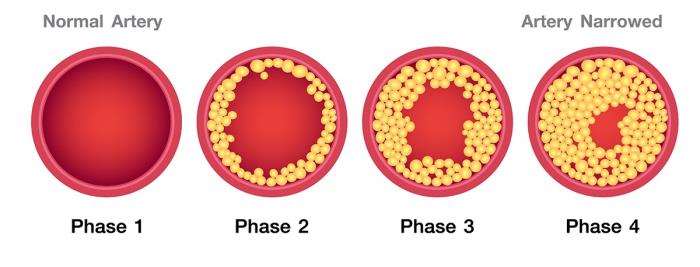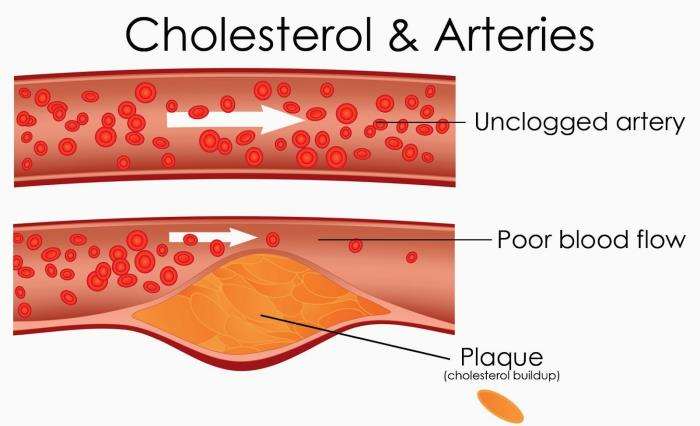Cholesterol plays a crucial role in maintaining overall cardiovascular health, but imbalances can contribute to severe conditions like aneurysms. Understanding how cholesterol influences aneurysm formation can help in early prevention, timely diagnosis, and effective management, reducing the risk of life-threatening complications.
Medical disclaimer: This content is for general awareness and does not replace a doctor’s consultation. For diagnosis or treatment decisions, consult a qualified specialist.
What Are Aneurysms and How Do They Develop?
An aneurysm occurs when a blood vessel wall weakens, leading to a bulge or dilation. Over time, the pressure from blood flow can cause the vessel to expand further, increasing the risk of rupture. Various factors, including genetic predisposition, hypertension, and unhealthy cholesterol levels, can accelerate aneurysm formation.
The Role of High Cholesterol in Aneurysm Formation
High cholesterol, particularly low-density lipoprotein (LDL), contributes to plaque buildup in arterial walls, known as atherosclerosis. This process weakens the vessel walls, making them more susceptible to dilation and aneurysm formation. Inflammation caused by cholesterol deposits can also exacerbate vascular damage.

Types of Aneurysms Affected by Cholesterol Levels
Elevated cholesterol levels are closely linked to aneurysms in arteries such as the abdominal aorta and cerebral arteries. Abdominal Aortic Aneurysm (AAA) is particularly associated with atherosclerosis, which is aggravated by high LDL cholesterol and low high-density lipoprotein (HDL) cholesterol.
The Importance of Early Detection of High Cholesterol
Monitoring and managing cholesterol levels are vital in preventing aneurysms and other cardiovascular diseases. Regular screenings can help identify individuals at risk, enabling proactive measures such as lifestyle changes and medical interventions to mitigate the chances of aneurysm development.
How Cholesterol Impacts Blood Vessel Integrity
Cholesterol affects the structural integrity of blood vessels by promoting plaque formation and inflammation, leading to reduced elasticity and wall strength. Over time, this weakens the arterial walls, creating a conducive environment for aneurysms to form, particularly in high-pressure areas.
Lifestyle Changes for Managing Cholesterol and Preventing Aneurysms
Adopting a heart-healthy lifestyle can significantly reduce the risk of aneurysms. This includes a balanced diet rich in fiber and low in saturated fats, regular exercise, and quitting smoking. For individuals with persistently high cholesterol, medications like statins may be recommended to lower LDL levels and protect blood vessel health.
The Role of Diet in Controlling Cholesterol Levels
Diet plays a pivotal role in managing cholesterol levels, significantly reducing the risk of aneurysm development. Consuming heart-healthy foods such as fruits, vegetables, whole grains, and lean proteins can lower bad cholesterol (LDL) and increase good cholesterol (HDL). Limiting saturated fats, trans fats, and added sugars is equally essential to maintain a healthy lipid profile. Incorporating omega-3 fatty acids, found in fish and nuts, further promotes cardiovascular health and helps in aneurysm prevention.
Physical Activity: Enhancing Cardiovascular Health to Prevent Aneurysms
Regular physical activity improves cardiovascular health by managing cholesterol levels, lowering blood pressure, and reducing inflammation. Activities like brisk walking, cycling, swimming, or strength training enhance blood circulation and strengthen the arterial walls, decreasing the likelihood of aneurysm formation. Experts recommend at least 150 minutes of moderate-intensity exercise weekly for optimal heart and vascular health.
Medications for Cholesterol Management: Statins and Beyond
Statins are a cornerstone in cholesterol management, effectively reducing LDL cholesterol and stabilizing arterial plaques, which helps prevent aneurysms. Newer medications like PCSK9 inhibitors, bile acid sequestrants, and niacin offer additional options for individuals with severe cholesterol issues or those intolerant to statins. These medications, often prescribed alongside lifestyle changes, ensure comprehensive cholesterol control and vascular health.
The Benefits of Regular Cholesterol Screenings
Routine cholesterol screenings are vital for early detection and management of abnormal lipid levels. Monitoring cholesterol allows healthcare providers to identify individuals at risk for aneurysms and cardiovascular diseases, enabling timely intervention. For adults, a lipid profile test every four to six years is generally recommended, or more frequently for those with a family history of high cholesterol or heart disease.

Reducing Inflammation: A Key to Aneurysm Prevention
Chronic inflammation contributes to the weakening of arterial walls, increasing the risk of aneurysms. A diet rich in anti-inflammatory foods like berries, leafy greens, and fatty fish can counteract this effect. Additionally, managing chronic conditions such as diabetes and hypertension further reduces inflammation and strengthens vascular health.
Smoking and Its Effect on Cholesterol and Aneurysm Risk
Smoking significantly raises the risk of aneurysms by accelerating arterial damage and lowering HDL cholesterol levels. The toxins in cigarettes promote plaque buildup and inflammation, weakening the blood vessels. Quitting smoking not only improves cholesterol levels but also substantially decreases the likelihood of aneurysm formation and rupture.
The Role of Genetics in Cholesterol Levels and Aneurysm Development
Genetic factors influence cholesterol levels and predispose individuals to aneurysm development. Familial hypercholesterolemia, a genetic condition, can cause abnormally high cholesterol levels, requiring early and aggressive treatment. Understanding one's genetic risk can guide preventive measures, such as regular screenings and tailored lifestyle modifications.
Case Studies: How Effective Cholesterol Management Prevented Aneurysms
Case studies have shown that individuals who effectively manage their cholesterol through diet, exercise, and medication experience significantly reduced risks of aneurysms. For example, patients who adhered to statin therapy and adopted a Mediterranean diet showed improved arterial health, with some even reversing early signs of vascular damage.
Advances in Medical Research on Cholesterol and Aneurysm Prevention
Ongoing research continues to uncover links between cholesterol management and aneurysm prevention. Innovations in lipid-lowering therapies, such as gene editing and RNA-based treatments, hold promise for those with genetic predispositions. Understanding the molecular mechanisms of cholesterol and inflammation further enhances prevention strategies.
The Role of Healthcare Providers in Cholesterol Management
Healthcare providers play a crucial role in educating patients about cholesterol management and its impact on aneurysm prevention. Regular consultations, personalized treatment plans, and support for lifestyle changes ensure that patients stay on track with their health goals. Collaborative care between primary physicians, cardiologists, and dietitians maximizes treatment outcomes.
Patient Education: Understanding the Risks of Untreated High Cholesterol
Educating patients about the dangers of untreated high cholesterol is essential for motivating proactive health management. High cholesterol often presents no symptoms, making awareness campaigns and clear communication critical in emphasizing the importance of regular checkups and adherence to prescribed treatments.
The Impact of Obesity on the Development of Abdominal Aortic Aneurysm
Understand how obesity influences the risk of developing an abdominal aortic aneurysm. Excess body weight places additional strain on blood vessels, increasing the risk of arterial damage and aneurysm formation. This article delves into the link between obesity and vascular health, emphasizing the importance of weight management in preventing aneurysms.
How Diabetes Affects the Risk and Treatment of Abdominal Aortic Aneurysm
Learn about the complex relationship between diabetes and abdominal aortic aneurysms. While diabetes may lower the risk of aneurysm formation, it complicates treatment and management due to vascular and metabolic challenges. Explore how this condition influences surgical outcomes and the role of blood sugar control in managing risks.
Long-Term Strategies for Maintaining Healthy Cholesterol Levels
Long-term cholesterol management requires a combination of lifestyle changes and medical interventions. Maintaining a balanced diet, engaging in regular exercise, avoiding smoking, and adhering to prescribed medications are foundational practices. Consistent follow-ups with healthcare providers ensure sustained health benefits and early detection of potential issues.
Best AAA Surgeons in India
The Best AAA Surgeons in India are experts in vascular surgery, providing personalized care and advanced techniques to ensure effective aneurysm treatment and patient safety.
Conclusion: Preventing Aneurysms Through Proactive Cholesterol Management
Managing cholesterol levels is a cornerstone of aneurysm prevention and overall cardiovascular health. Through a combination of dietary modifications, regular exercise, routine screenings, and appropriate medications, individuals can significantly reduce their risk of aneurysms and related complications. Proactive and informed health management ensures better outcomes and a healthier future.
FAQ
How does high cholesterol contribute to aneurysm formation?
High cholesterol leads to plaque buildup in arteries, weakening their walls and increasing the risk of aneurysm development.
Can managing cholesterol levels reduce the risk of aneurysm rupture?
Yes, controlling cholesterol stabilizes arterial walls and reduces the likelihood of aneurysm growth and rupture.
What are the best dietary practices for lowering cholesterol?
A diet rich in fruits, vegetables, whole grains, lean proteins, and healthy fats, while avoiding saturated fats and trans fats, is recommended for cholesterol management.
Are statins effective in preventing aneurysms?
Statins lower LDL cholesterol and stabilize arterial plaques, making them highly effective in reducing aneurysm risk.
How often should one check cholesterol levels for optimal heart and vascular health?
Adults should have a lipid profile test every four to six years, or more frequently if they have risk factors like family history or chronic conditions.
Explore the Best Heart Care Resources in India
Find some of the top cardiologist, surgeons and the best heart hospitals in India
Best Heart Hospitals in India
Choosing the right hospital is crucial for successful heart treatments. If you want to explore trusted options, check the list of Best Heart Hospitals in India offering world-class facilities, advanced cardiac care units, and experienced teams for both simple and complex procedures.
Best Cardiologists in India
Finding the right cardiologist can make a huge difference in early diagnosis and long-term heart health. If you are looking for the Best Cardiologists in India, see this curated list of experts who specialize in preventive care, interventional cardiology, and complex heart disease management. Check the full list Best Cardiologists in India.
Best Cardiac Surgeons in India
If you are planning for heart surgery and need top-level expertise, we recommend exploring the Best Cardiac Surgeons in India. These surgeons have a proven record in performing bypass surgeries, valve replacements, and minimally invasive heart operations with excellent outcomes.
Get more indepth information on Cardiology treatments and their costs.
Conclusion
Your cardiology health deserve the best care. Explore the links above to learn more about the top cardiac hospitals and cardiac surgeons in India.
Recovery time after abdominal aortic aneurysm (AAA) surgery varies based on the procedure and individual patient factors. Endovascular surgery typically involves faster recovery, taking about 2 to 6 weeks, with shorter hospital stays and less post-operative pain. Open surgery requires a longer recovery period, often several months, with extended hospital stays. Post-surgery, following medical advice on activity levels, wound care, and medication is essential. Gradual physical activity, like walking, is encouraged, while avoiding strenuous activities and heavy lifting for at least 6 weeks. Regular follow-ups ensure optimal recovery and health monitoring. Post Surgery Recovery Time for Abdominal Aortic Aneurysm Patients
Diabetes mellitus (DM) has a complex relationship with abdominal aortic aneurysms (AAAs). While epidemiological studies suggest that diabetes may reduce the risk of developing AAAs and slow their progression, diabetic patients often face higher risks of complications during and after treatment. Managing blood sugar levels and addressing comorbidities are crucial for improving outcomes in diabetic patients undergoing AAA treatment. How Diabetes Affects the Risk and Treatment of Abdominal Aortic Aneurysm
Obesity is a significant risk factor for the development of abdominal aortic aneurysms (AAAs). Excess body weight contributes to chronic inflammation and atherosclerosis, which can weaken the arterial walls and lead to aneurysms. Additionally, obesity is often associated with other risk factors such as hypertension and diabetes, further increasing the likelihood of AAAs. Managing weight through a healthy diet and regular exercise is crucial for reducing the risk of AAAs and improving overall cardiovascular health. The Impact of Obesity on the Development of Abdominal Aortic Aneurysm